

Austeja Norvaisaite
Growth hacker and strategic partnership coordinator. Passionate about blending creativity with data-driven insights to craft accessible, resonant content for diverse audiences.
Singapore Startup Ecosystem in 2025: Regional APAC Expansion
- Last Time Updated: 25th of January, 2026
The Singapore startup ecosystem in 2025 is one of the most dynamic in Asia. Founders, investors, and global companies see the city-state as a key gateway to APAC growth. With strong government support, advanced infrastructure, and access to diverse markets, Singapore continues to attract innovative startups across fintech, AI, deeptech, and healthtech. This article explores why Singapore leads, the latest trends, significant challenges, investor activity, and how founders can use Singapore as a springboard for APAC expansion.
Our approach aligns your growth strategy with investor expectations so you can secure capital and scale confidently in APAC.
Table of Contents
Why Singapore Leads in the APAC Startup Ecosystem?
The Singapore startup ecosystem 2025 is often called the heart of innovation in Asia. Its global reputation comes from more than just being a financial hub. Singapore blends firm government policy, world-class infrastructure, and investor-friendly frameworks that attract founders worldwide. Startups choose Singapore not only for its local opportunities but also for its role as the best launchpad into Asia-Pacific markets.
One of the main reasons why startups choose Singapore in 2025 is stability. The country consistently ranks as one of the easiest places in the world to do business. The corporate tax system is transparent, and intellectual property laws give startups confidence that their innovations are protected. These factors encourage international startups and investors to establish headquarters or R&D centers in Singapore.
Another driver is connectivity. Located in the center of Southeast Asia, Singapore provides fast access to booming markets like Indonesia, Vietnam, Thailand, and Malaysia. For startups seeking regional APAC expansion through Singapore, this geographic advantage is critical. Founders can test products in a stable and wealthy environment while planning larger-scale rollouts in neighboring countries.
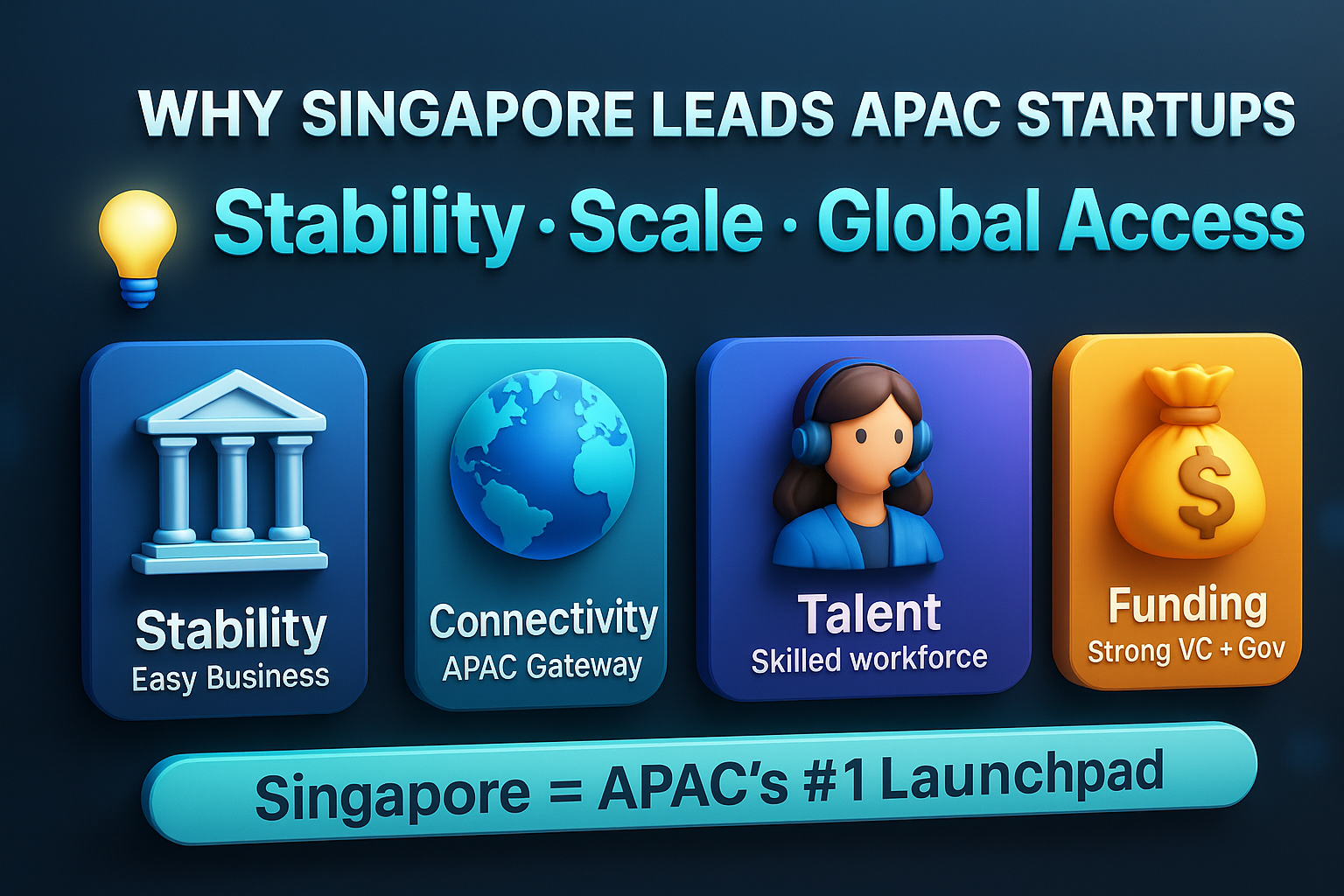
Talent also plays a significant role in shaping the startup hub Singapore has become. English is widely spoken, and the government actively invests in education and training for tech and entrepreneurship. With programs supporting AI, biotech, and fintech, startups can easily recruit skilled employees. While some challenges exist, such as talent costs, the overall pool remains highly competitive compared to other hubs in Asia.
Finally, Singapore’s funding landscape is unmatched in the region. The presence of both global and regional venture capital firms, combined with strong government-backed initiatives like Enterprise Singapore, makes capital more accessible. Founders in fintech, AI, and deeptech find strong early-stage and growth-stage support from venture capital in Singapore in 2025.
These combined advantages – stability, connectivity, talent, and funding – explain why Singapore continues to dominate as the leading startup ecosystem in APAC. Founders don’t just see it as a place to build; they see it as a place to scale.
Key Trends in the Singapore Startup Scene 2025
The Singapore startup ecosystem in 2025 is changing rapidly, driven by technology adoption, sustainability, and global investment flows. Founders entering the ecosystem must understand these emerging patterns to compete regionally and globally. Below are the two most defining areas shaping the startup scene in Singapore this year.
Digital Innovation and Sector Growth
In 2025, digital-first sectors continue to lead in Singapore, according to the IMD World Competitiveness Ranking 2025. Singapore ranks among the top three globally for digital competitiveness, proving its strength as a technology hub. This growth is particularly visible in fintech, AI startups, healthtech, and green tech, all of which attract global attention.
Fintech remains the crown jewel of the Singapore startup scene. MAS (Monetary Authority of Singapore) continues to encourage fintech innovation, while digital payment adoption across Asia strengthens demand. Startups in digital banking, blockchain, and cross-border payments find Singapore the perfect testing ground. AI adoption is another major trend, with both consumer AI and enterprise AI applications gaining investment.
Healthtech has surged in importance, especially as Singapore positions itself as a regional healthcare innovation hub. From telemedicine to AI-assisted diagnostics, Singaporean startups are scaling into nearby ASEAN markets where healthcare systems are growing fast.
Green tech and sustainability also define 2025. With Singapore’s Green Plan 2030, climate-focused startups in renewable energy, urban farming, and circular economy models are heavily supported. Investors are increasingly prioritizing sustainable startups in Singapore as ESG requirements grow in importance.
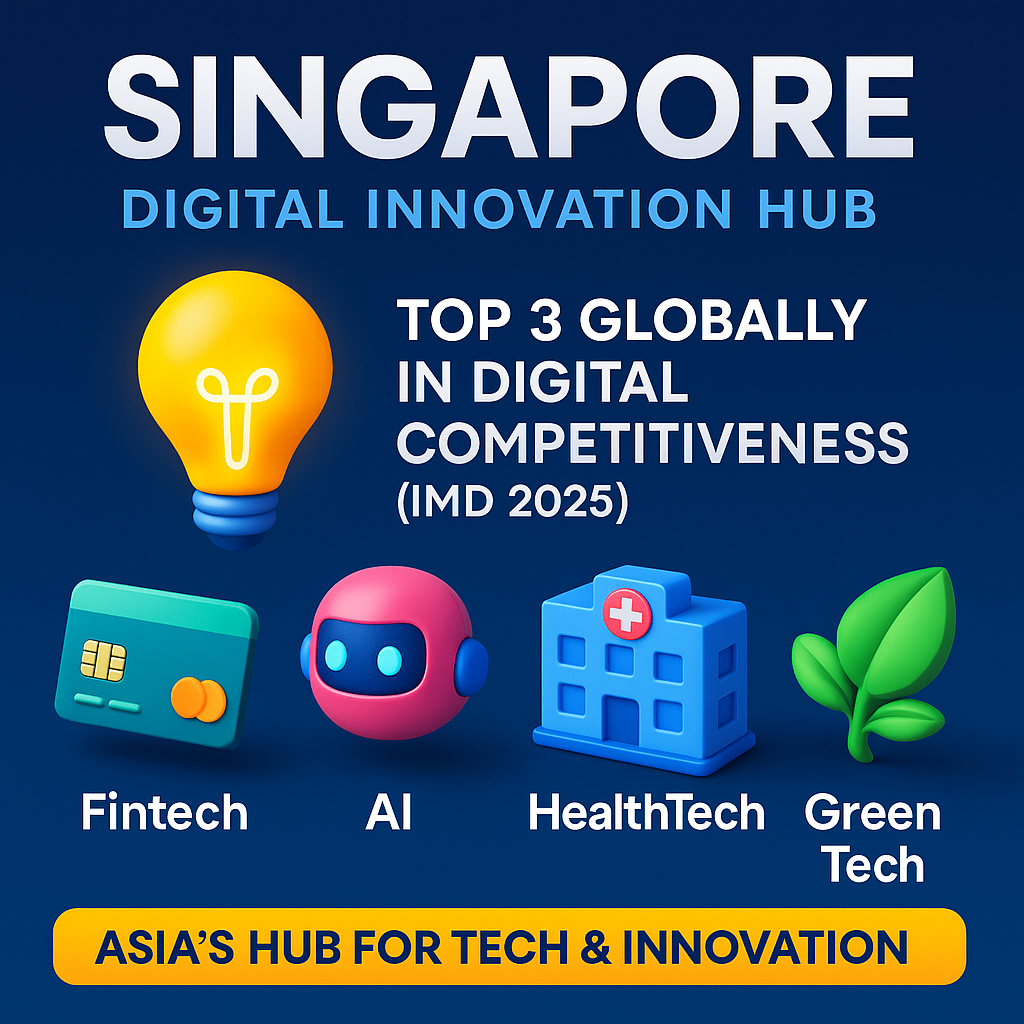
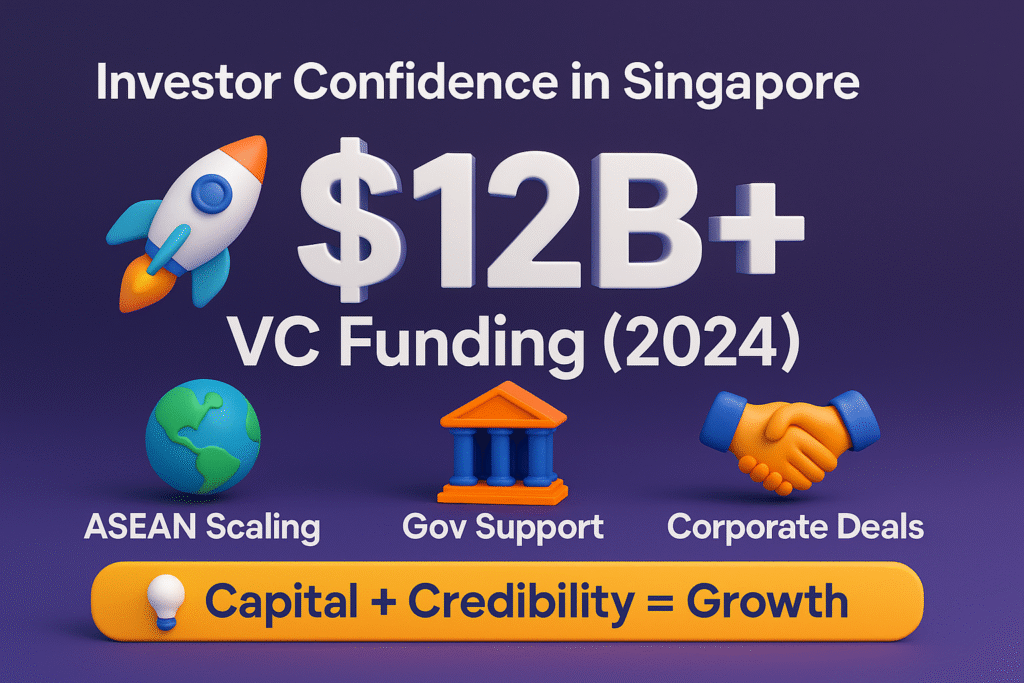
Investor Confidence and Cross-Border Scaling
A major reason why the Singapore startup ecosystem thrives in 2025 is the confidence of global investors. Singapore ranked as the top destination in Southeast Asia for startup funding according to Startup Genome’s Global Startup Ecosystem Report 2025. More than $12 billion in VC funding flowed into Singapore-based startups in 2024, and projections for 2025 remain strong.
Investors see Singapore as a safe entry point into ASEAN. By setting up in Singapore, startups gain credibility that helps them expand into emerging markets like Vietnam and Indonesia. This cross-border scaling advantage continues to attract both venture capital firms and angel investors.
Government grants and co-investment schemes amplify investor confidence. Programs like Enterprise Singapore’s Startup SG Equity provide matching funds, which reduces investor risk. This model has helped scale deeptech startups in Singapore, including AI robotics and biotech ventures.
Beyond venture capital, corporate partnerships are on the rise. Multinational corporations based in Singapore increasingly collaborate with local startups, providing market access and distribution networks. This trend is particularly strong in logistics, fintech, and healthtech startups, where corporate resources accelerate scaling across APAC.
In short, investor confidence in Singapore 2025 is creating a flywheel effect. More capital means more innovation, which brings in more international attention, further reinforcing Singapore’s status as the startup hub of Southeast Asia.
Challenges Facing Startups in Singapore 2025
While the Singapore startup ecosystem 2025 offers many opportunities, founders must also prepare for challenges that can slow growth. Here are the most pressing hurdles startups face today.
High Operating Costs in Singapore
The cost of building a startup in Singapore is one of the highest in Asia. Office rents, salaries, and compliance fees often exceed what early-stage founders expect, according to Statista 2025. Singapore remains the most expensive city in Southeast Asia for expatriates and is ranked among the top globally for living costs. For bootstrapped startups in Singapore, this pressure can quickly burn through limited seed funding.
Talent Competition Across APAC
Although Singapore offers access to a skilled workforce, the competition for top tech talent is fierce. Many startups struggle to recruit engineers, AI specialists, and growth marketers because multinational companies offer higher pay. This talent war makes it difficult for early-stage founders to scale teams fast. For startups hiring in Singapore in 2025, balancing talent quality with budget is one of the most challenging tasks.
Regulatory Complexity and Compliance
Singapore has a reputation for transparent regulations, but compliance demands are still heavy for foreign founders. Incorporation, licensing, and tax filing require significant time and resources. Industries like fintech or healthtech face stricter checks, delaying go-to-market launches. For international startups expanding to Singapore, navigating regulations is often more complex than expected.
Regional Expansion Pressure
Founders don’t come to Singapore to serve its 5.9 million residents. The expectation is to expand into Southeast Asia fast. But scaling from Singapore into APAC markets requires understanding cultural, legal, and digital infrastructure differences. Many startups underestimate these challenges, leading to failed expansion attempts or wasted marketing spend in countries like Indonesia or Vietnam.
Singapore remains the leading APAC startup hub in 2025, but overcoming high costs, talent shortages, complex regulations, and expansion hurdles is critical for success. Founders who prepare for these realities can still build strong, scalable businesses from Singapore.
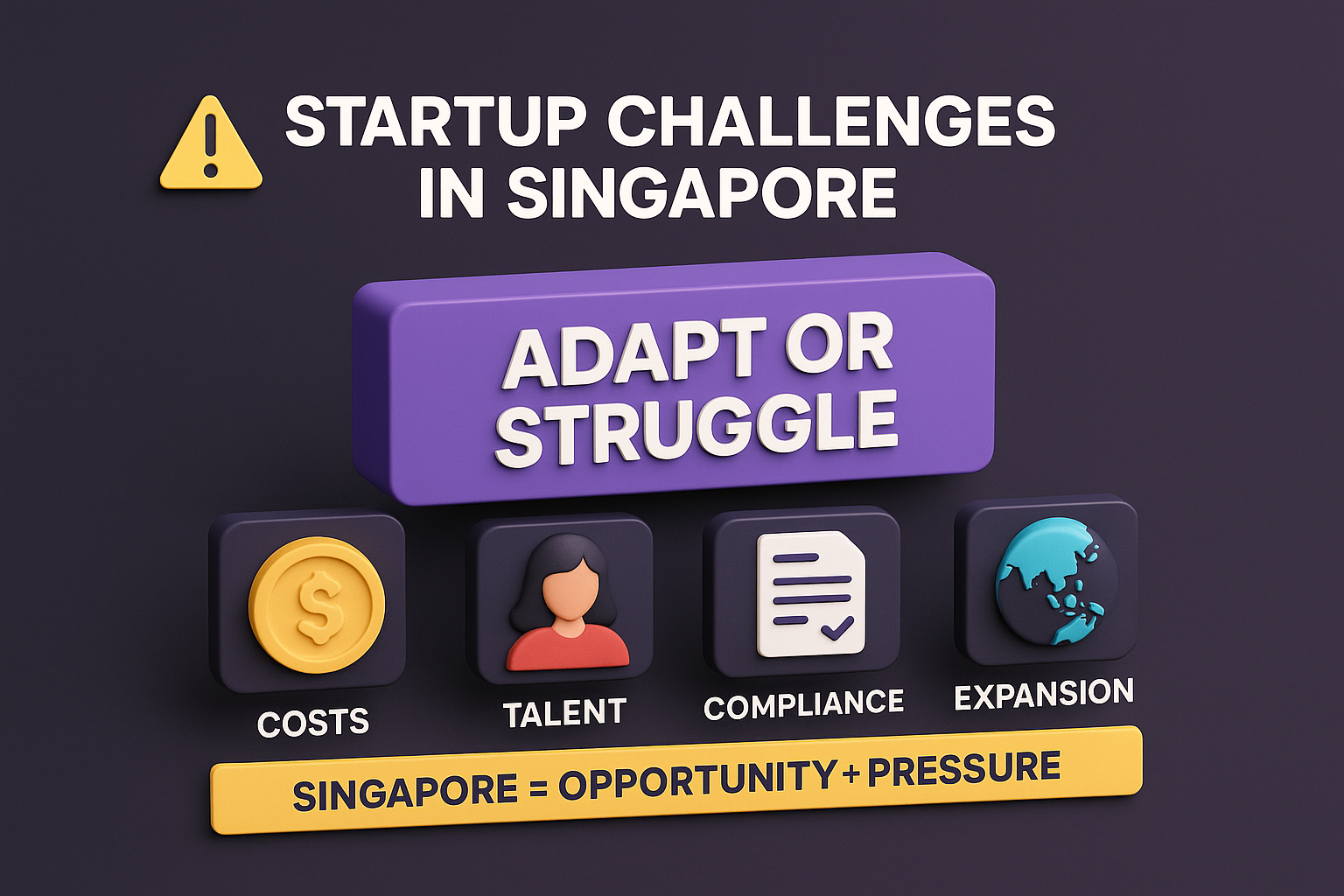
Funding Landscape for Singapore Startups in 2025
Funding defines how startups scale, and in 2025 the Singapore startup funding ecosystem is one of the strongest in Asia. Founders benefit from a mix of venture capital, angel investors, corporate funds, and government grants. But competition for capital is intense, and startups must show traction and scalability to secure it.
Investor Trends in 2025
According to Startup Genome’s Global Startup Ecosystem Report 2025, Singapore attracted more than $12 billion in venture funding in 2024, with fintech, AI, and healthtech receiving the largest share. This trend continues in 2025, with a growing emphasis on sustainable startups and green technology.
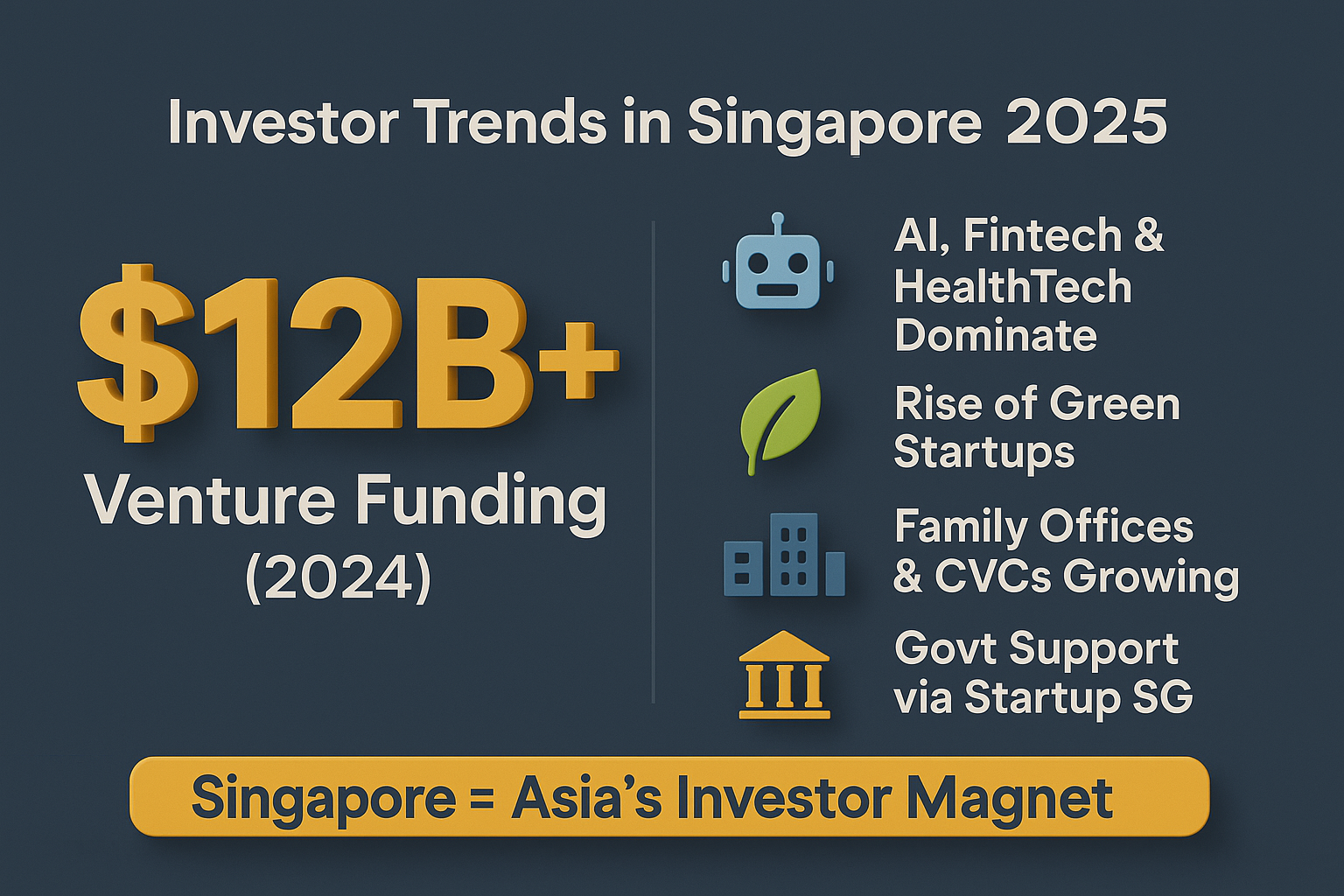
The rise of family offices and corporate venture arms in Singapore has diversified the investor pool. Many corporates now invest directly in early-stage companies to gain innovation advantages. Meanwhile, angel investors in Singapore 2025 are particularly active in pre-seed and seed rounds, filling the gap before VCs step in.
Government support remains strong through Enterprise Singapore’s Startup SG programs, which provide co-investment funds and grants for qualifying startups. Deeptech, biotech, and green solutions are often prioritized.
Funding Options for Startups in 2025
The table below shows the major startup funding sources in Singapore 2025, their focus areas, and average deal sizes:
| Funding Source | Typical Stage | Focus Areas | Avg. Deal Size (USD) | Key Advantage | Challenge |
|---|---|---|---|---|---|
| Venture Capital (VCs) | Seed to Series C | Fintech, AI, SaaS, Healthtech | $1M – $50M | Large capital & expertise | High bar for traction |
| Angel Investors | Pre-seed to Seed | Consumer apps, early SaaS | $50K – $500K | Flexible, fast | Limited follow-on funding |
| Corporate Venture Funds | Seed to Growth | Logistics, Fintech, Deeptech | $500K – $20M | Market access & partnerships | Alignment with corporate goals |
| Government Grants (Startup SG) | Pre-seed to Growth | Deeptech, Green Tech | $30K – $1M | Non-dilutive capital | Competitive & selective |
| Family Offices | Seed to Series B | Mixed sectors | $250K – $5M | Patient capital | Hard to access networks |
| Crowdfunding | Pre-seed to Seed | Consumer brands, social startups | $10K – $200K | Community validation | Lower amounts raised |
What Founders Must Know?
Securing startup funding in Singapore 2025 is about more than just pitching. Investors expect strong traction, a clear go-to-market strategy, and early signs of scalability into APAC markets. Startups without these foundations often fail to attract capital, even if their idea is innovative.
Founders should also recognize that investors now value sustainability and ESG compliance. With Singapore’s Green Plan 2030 shaping policy, startups that align with sustainable practices gain a more potent edge in attracting capital. In short, Singapore’s funding landscape is rich with opportunity, but competition is fierce. Founders who target the right funding source at the right stage have the highest chance of building scalable startups.
Scaling Strategies for Singapore Startups in 2025
Scaling is the make-or-break stage for every founder. In 2025, the scaling strategies for Singapore startups reflect the country’s global position as an innovation hub. With strong infrastructure and investor backing, founders have opportunities to test and expand faster than in most markets. Below, we explore case studies that show how startups scale successfully in Singapore and beyond.
Case Study 1: Fintech Startup Expands Across Southeast Asia
A Singapore-based fintech company began by offering cross-border payment solutions for SMEs. By 2025, it faced stiff competition from global giants like Stripe and regional players like GrabPay. The startup used Singapore’s regulatory sandbox provided by the Monetary Authority of Singapore (MAS) to refine its compliance and test solutions in a safe environment.
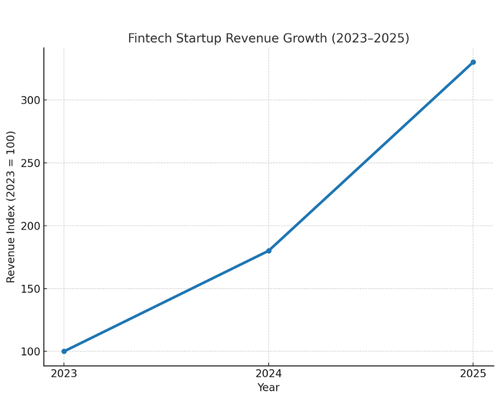
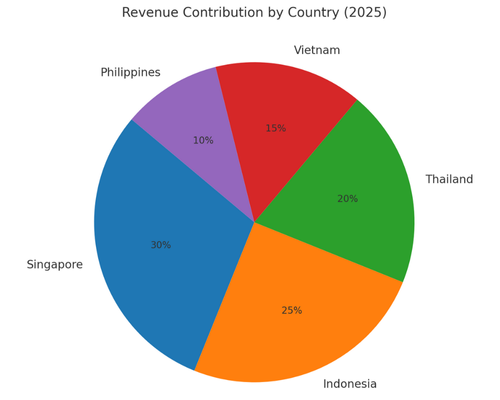
From there, it leveraged regional scaling strategies in Southeast Asia by forming partnerships with banks in Indonesia and Thailand. Access to bilingual, tech-savvy talent in Singapore helped the startup localize offerings quickly.
The result? Within two years, it expanded operations to five ASEAN countries, increasing revenue by 230%. This case highlights how fintech startups in Singapore in 2025 can use the city-state as both a testing ground and a launchpad.
Case Study 2: Healthtech Startup Leveraging Government Support
A healthtech startup developing AI-driven diagnostic tools launched in Singapore with the help of Enterprise Singapore’s Startup SG grants. By 2025, it needed to scale to compete with international medtech firms.
The company took advantage of Singapore’s proximity to leading research institutions and hospitals, creating pilot projects with the National University Health System. With government incentives and co-funding, it reduced R&D costs significantly.


For scaling, it targeted regional markets with significant healthcare gaps, such as Vietnam and the Philippines. Using Singapore’s reputation as a trusted hub for medtech innovation, the startup secured Series B funding from regional VCs. This case shows how healthtech scaling in Singapore 2025 benefits from government partnerships, international credibility, and regional expansion pathways.
Case Study 3: Ecommerce Startup Competing with Regional Giants
E-commerce is one of the most demanding industries in Southeast Asia. A Singaporean e-commerce startup selling eco-friendly consumer goods had to compete with Lazada and Shopee in 2025. Instead of head-on competition, the startup applied niche ecommerce scaling strategies.
It built a strong identity around sustainability and fair-trade supply chains, supported by Singapore’s Green Plan 2030 narrative. The startup optimized for cross-border ecommerce logistics in Singapore, leveraging Changi’s world-class cargo hub to ship goods quickly to APAC buyers.
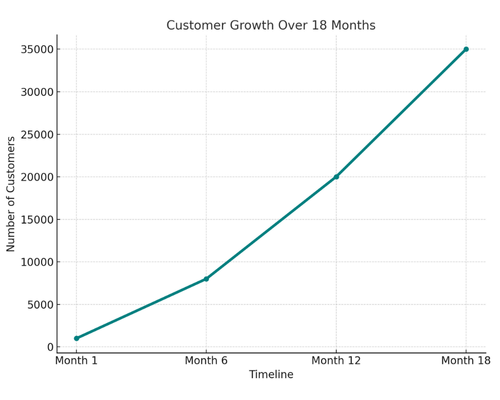
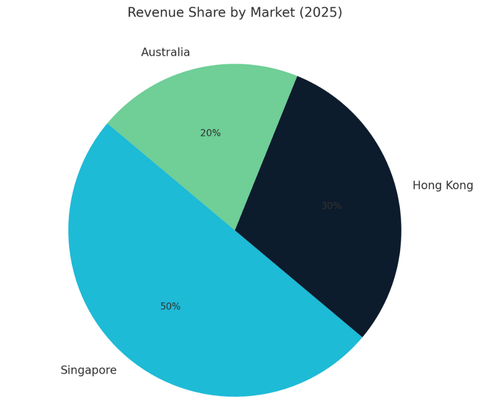
Through influencer partnerships and targeted digital ads, the company carved out a loyal customer base. Within 18 months, it became the top eco-lifestyle ecommerce platform in Singapore, then expanded to Hong Kong and Australia. This case highlights how e-commerce startups in Singapore in 2025 achieve success by differentiating themselves rather than competing directly.
Case Study 4: SaaS Startup Building Regional B2B Presence
A SaaS startup providing workflow automation tools began operations in Singapore in 2023. By 2025, it needed to scale aggressively to stand out in a crowded B2B SaaS market.
The company relied on B2B SaaS scaling strategies in Singapore, such as:
Building partnerships with multinational corporations headquartered in Singapore.
Targeting APAC markets with English-first SaaS platforms.
Using Singapore’s startup accelerator network for mentorship and visibility.
Within two years, it closed deals with enterprises in Singapore, Malaysia, and Australia. This growth was driven by Singapore’s reputation as a regional SaaS hub in 2025, where enterprises look for reliable vendors.
Lessons from Scaling in Singapore
Across fintech, healthtech, ecommerce, and SaaS, the lessons remain consistent:
Use Singapore as a testing ground for innovation.
Leverage government support programs to reduce risks.
Plan for regional scaling into Southeast Asia early.
Differentiate with sustainability, trust, or niche positioning.
These case studies show why Singapore startup scaling in 2025 is not just about raising funds, but about leveraging the ecosystem’s strengths to dominate APAC markets.
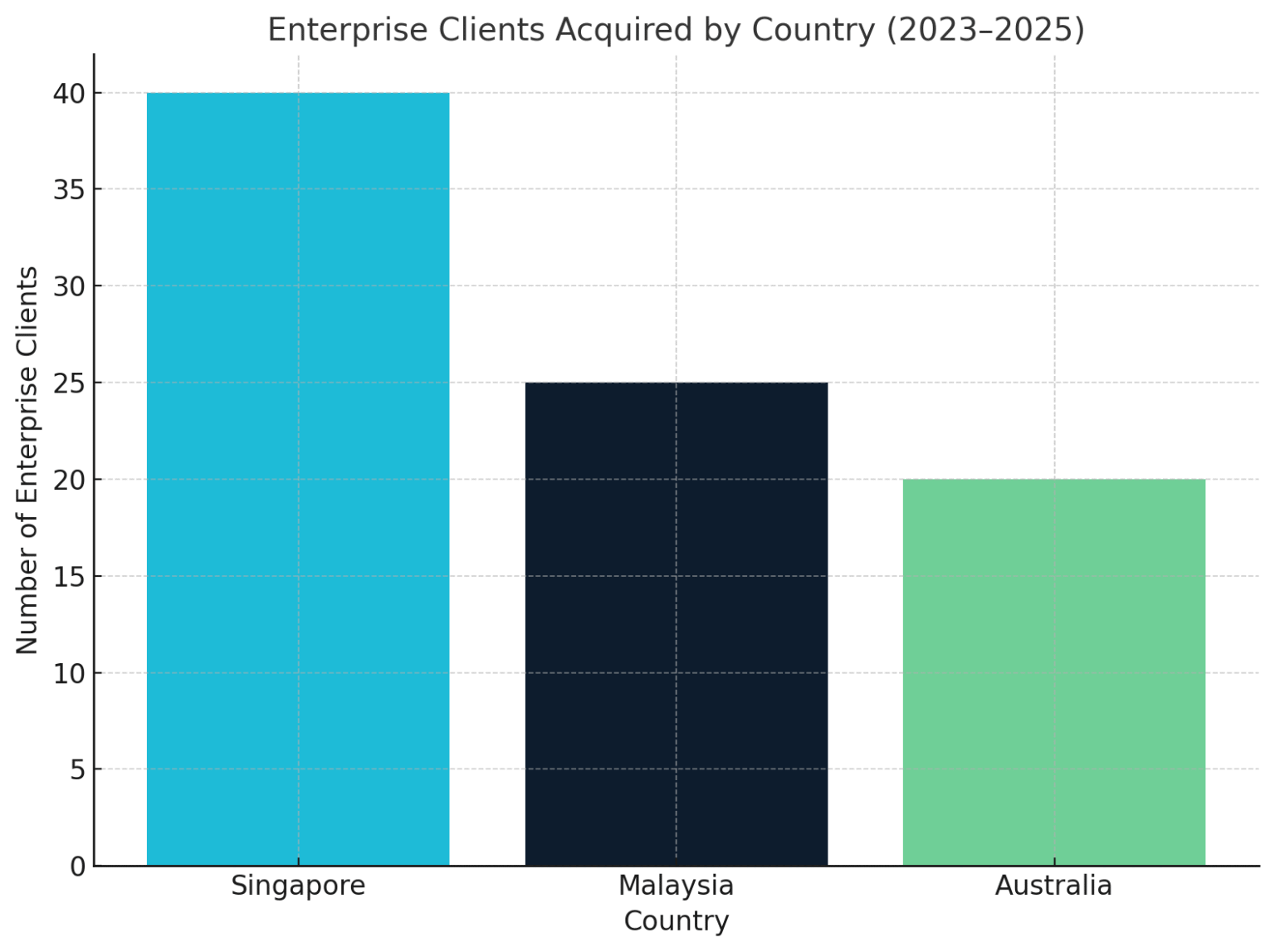
Challenges Facing Startups in Singapore 2025
While Singapore offers unmatched advantages, the startup ecosystem in Singapore 2025 is not without challenges. Founders must navigate rising costs, intense competition, and global market pressures. Below are two major hurdles startups face when scaling from Singapore.
Rising Costs and Talent Competition
One of the biggest challenges for startups in Singapore in 2025 is the high cost of operations. Office rents, software subscriptions, and marketing expenses are significantly higher compared to other Southeast Asian hubs like Bangkok or Ho Chi Minh City.
Talent costs are also rising. According to Singapore’s Ministry of Manpower, median monthly wages increased by 6.5% in 2025. For early-stage startups, competing with multinational companies for engineers, data scientists, and growth marketers can be overwhelming.
Startups are often forced to:
Hire hybrid teams that combine local experts with remote talent from neighboring countries.
Leverage government hiring subsidies to offset payroll.
Focus on lean scaling strategies to stretch runway.
Despite these solutions, the reality is that talent acquisition in Singapore 2025 remains one of the toughest barriers to growth.
Global Competition and Market Saturation
Another challenge is global competition in Singapore’s startup ecosystem. Because Singapore is positioned as the APAC hub, startups are competing not just with local peers, but also with international entrants from the US, Europe, and China.
Sectors like fintech, SaaS, and ecommerce are becoming saturated. For instance, fintech investment in Singapore reached $3.5 billion in 2025, but much of that funding goes to already dominant players. Smaller startups often struggle to attract attention from investors when unicorns dominate headlines.
To survive, startups must:
Identify underserved niches instead of competing head-on with global giants.
Focus on product differentiation and brand positioning.
Leverage Singapore’s APAC credibility to build trust when entering new markets.
This environment means startup founders in Singapore 2025 must be strategic. Without clear positioning and competitive advantages, survival becomes nearly impossible in such a crowded ecosystem.
The Role of Investors in Singapore’s Startup Ecosystem 2025
Investors play a critical role in shaping the Singapore startup ecosystem in 2025, driving capital, mentorship, and global connections. Without active venture capital firms, angel investors, and corporate funds, many startups would struggle to scale beyond the early stages.
Venture Capital Driving Regional Growth
Venture capital in Singapore continues to thrive in 2025, positioning the country as Southeast Asia’s financial powerhouse. According to DealStreetAsia, Singapore accounted for 52% of all VC deals in Southeast Asia in early 2025. Sectors like fintech, AI, and green technology dominate VC interest, with late-stage funding rounds frequently surpassing $100 million.
For startups, this VC presence brings:
Access to international networks across APAC, Europe, and the US.
Capital for scaling fast, especially into large markets like Indonesia or India.
Strategic mentorship from seasoned investors with global experience.
However, the VC landscape is also competitive. Founders need strong traction, differentiated products, and robust financial models to stand out in Singapore’s deal-heavy environment.
Angel Investors and Corporate Funds Fueling Early-Stage Innovation
While VCs focus on scale-ups, angel investors and corporate venture funds play a vital role in early-stage funding. Singapore’s angel network in 2025 is more active than ever, with communities like AngelCentral and BANSEA connecting hundreds of private investors with promising startups.
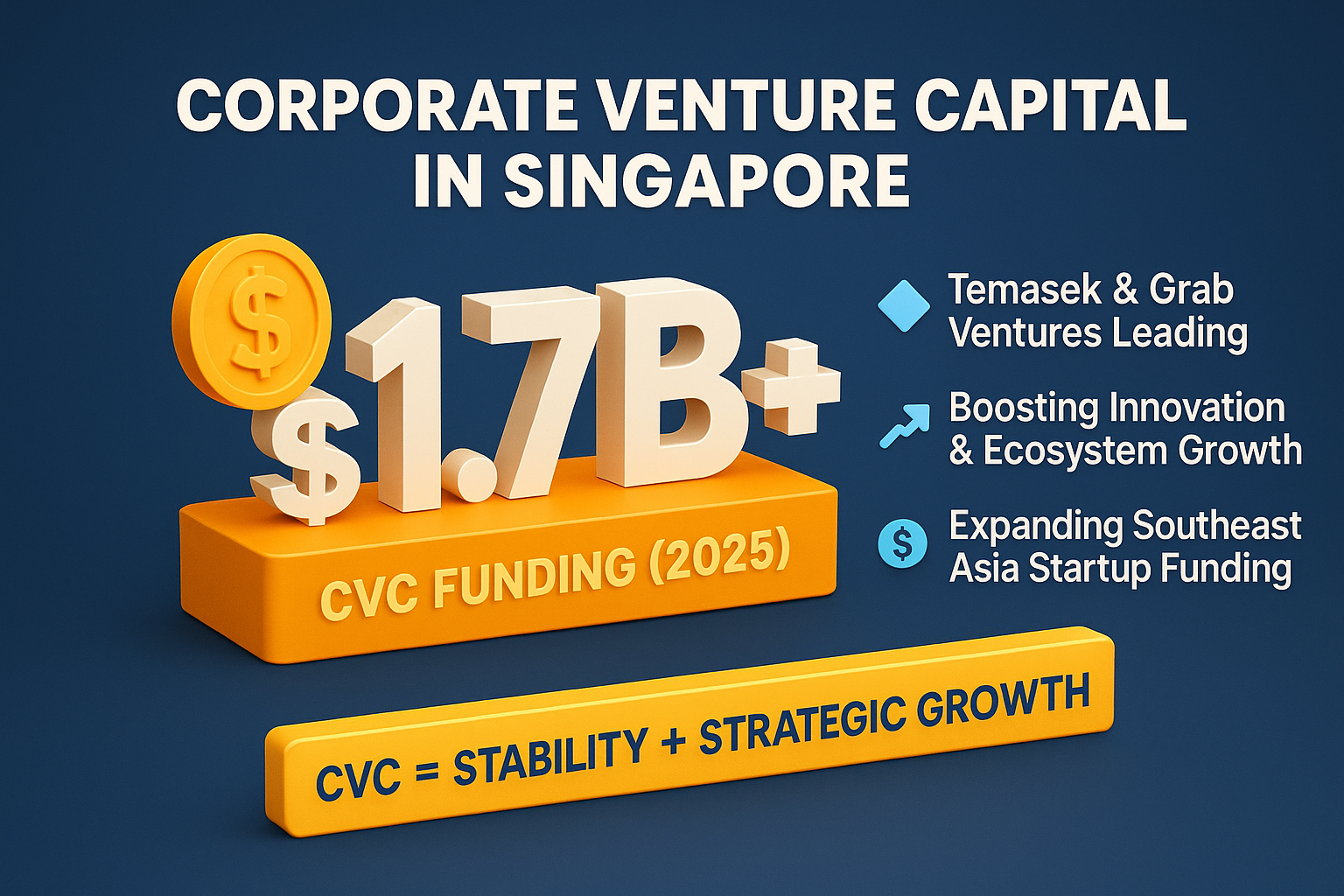
Corporate venture capital (CVC) is also expanding. Giants like Temasek Holdings and Grab Ventures invest in strategic startups, fueling both innovation and ecosystem stability. According to TechNode Global, corporate-backed funds contributed over $1.7 billion to Southeast Asian startups in 2025.
For early-stage founders, these investors provide:
Seed capital to test product-market fit.
Industry partnerships that help validate solutions.
Market entry support for regional expansion.
Together, VCs, angels, and corporate funds ensure that the Singapore startup ecosystem in 2025 remains one of the most well-financed globally. The diversity of funding sources allows startups at every stage – from idea to unicorn – to find the right backers.
Government Support and Startup Policies in Singapore 2025
Government initiatives remain the backbone of the Singapore startup ecosystem in 2025. Through funding programs, tax incentives, and pro-business policies, the state actively nurtures innovation and entrepreneurship. Founders benefit from a stable environment designed to reduce barriers and accelerate scaling.
Funding and Incentive Programs
The Singapore government continues to allocate significant resources toward startup growth. According to Enterprise Singapore, more than $1.5 billion has been earmarked for startup development programs in 2025.
Key forms of support include:
Startup SG grants for early-stage validation and proof-of-concept projects.
Tax rebates and exemptions for startups operating in priority industries like fintech, AI, and green energy.
Co-investment schemes where government funds match private VC capital to reduce risk.
This landscape ensures that government-backed startup incentives in Singapore remain a strong advantage for founders compared to other APAC markets.
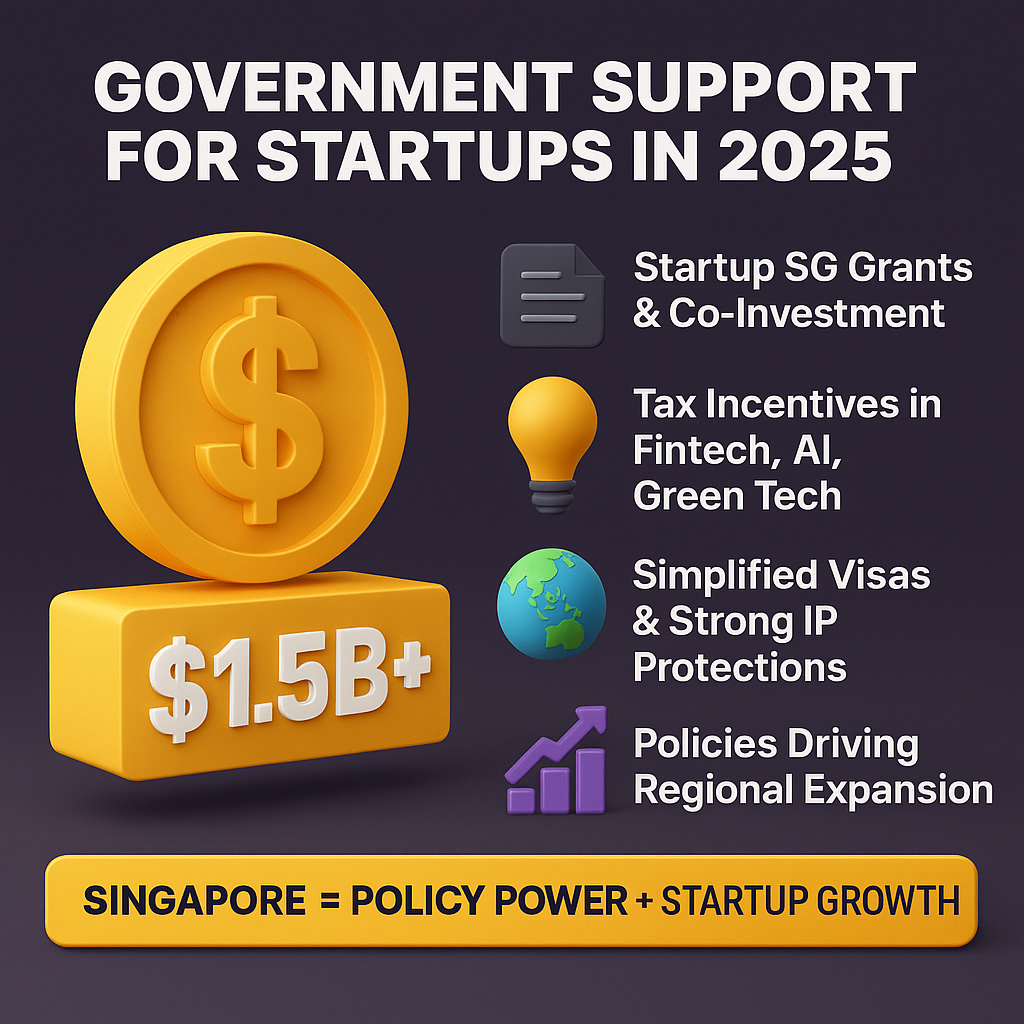
Policies Supporting Innovation and Regional Expansion
Beyond funding, pro-startup policies in Singapore focus on simplifying business operations and encouraging global expansion. In 2025, streamlined visa rules make it easier for startups to hire foreign specialists, while intellectual property protections remain among the strongest in Asia.
Regulatory frameworks are also adapting to fast-moving industries. For instance, the Monetary Authority of Singapore continues to refine fintech policies to support digital banks, while environmental standards encourage sustainability-driven business models.
These policies strengthen Singapore’s role as a regional startup hub in APAC 2025, giving founders the infrastructure to innovate while expanding across Southeast Asia. Government support not only reduces risk but also enhances credibility in the eyes of investors and global partners.
Scaling Beyond Singapore – APAC and Global Expansion
The Singapore startup ecosystem in 2025 is not only about thriving locally. Startups here are designed for global reach. With a strong domestic foundation, founders naturally look outward to expand into APAC and beyond. Singapore’s geographic position, financial strength, and trade connections make it the launchpad for regional and international growth.
Why APAC Expansion Starts from Singapore?
Startups in Singapore see the APAC region as their first growth target. Southeast Asia alone has more than 680 million consumers, and according to Statista, e-commerce revenue in Southeast Asia will surpass $180 billion in 2025.
Key APAC advantages for startups include:
Proximity to high-growth markets such as Indonesia, Vietnam, and the Philippines.
Regional free-trade agreements that lower market entry barriers.
Investor appetite for APAC-focused businesses in fintech, healthtech, and e-commerce.
Singapore’s strong global brand also enhances trust. Startups expanding from Singapore are often perceived as more credible, giving them an edge when entering new markets.
Pathways to Global Markets
While APAC is the first step, many Singapore startups in 2025 set sights on global markets in Europe, the US, and the Middle East. With one of the world’s most open economies, Singapore offers multiple pathways to scale internationally:
Strategic partnerships with global corporations headquartered in Singapore.
Government trade support through Enterprise Singapore’s global innovation alliance.
International venture capital networks that fund cross-border expansion.
According to Crunchbase, more than 45% of Singapore-based startups funded in 2025 secured international investors (Crunchbase). This shows that Singapore is not just a regional hub – it’s a stepping stone to global influence.
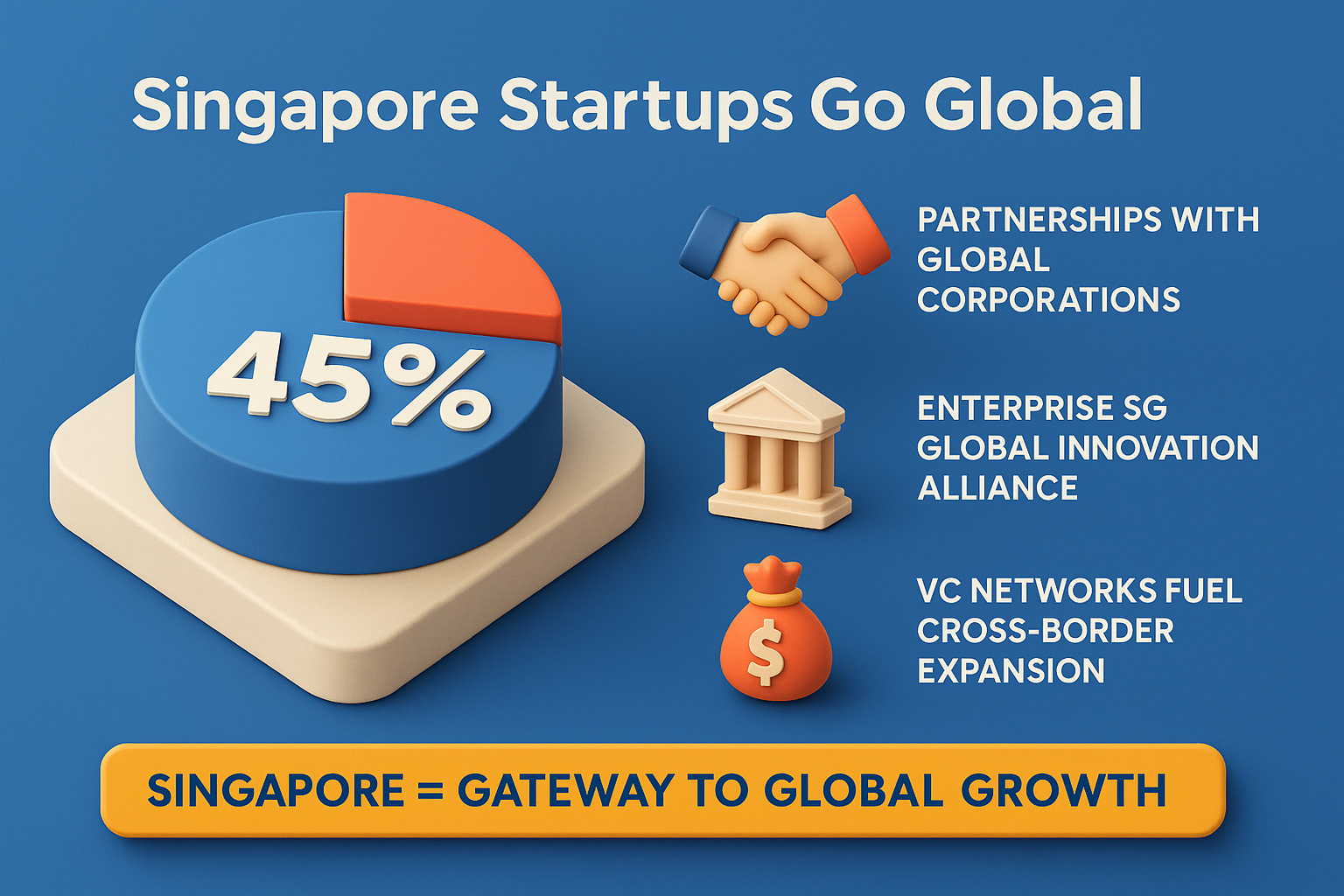
Startups leveraging Singapore’s reputation, legal stability, and capital markets find it easier to close deals abroad and secure partnerships in competitive regions.
Challenges in Scaling Abroad
Despite advantages, expanding globally comes with hurdles. Competition in mature markets is intense, while regulatory landscapes differ. Startups must adapt their models to meet local consumer needs, manage cross-border compliance, and handle increased operational costs.
Still, the Singapore startup ecosystem in 2025 equips founders with tools, funding, and mentorship to overcome these barriers. Those who succeed can transition from regional players into global innovation leaders.
Future Outlook for the Singapore Startup Ecosystem in 2025 and Beyond
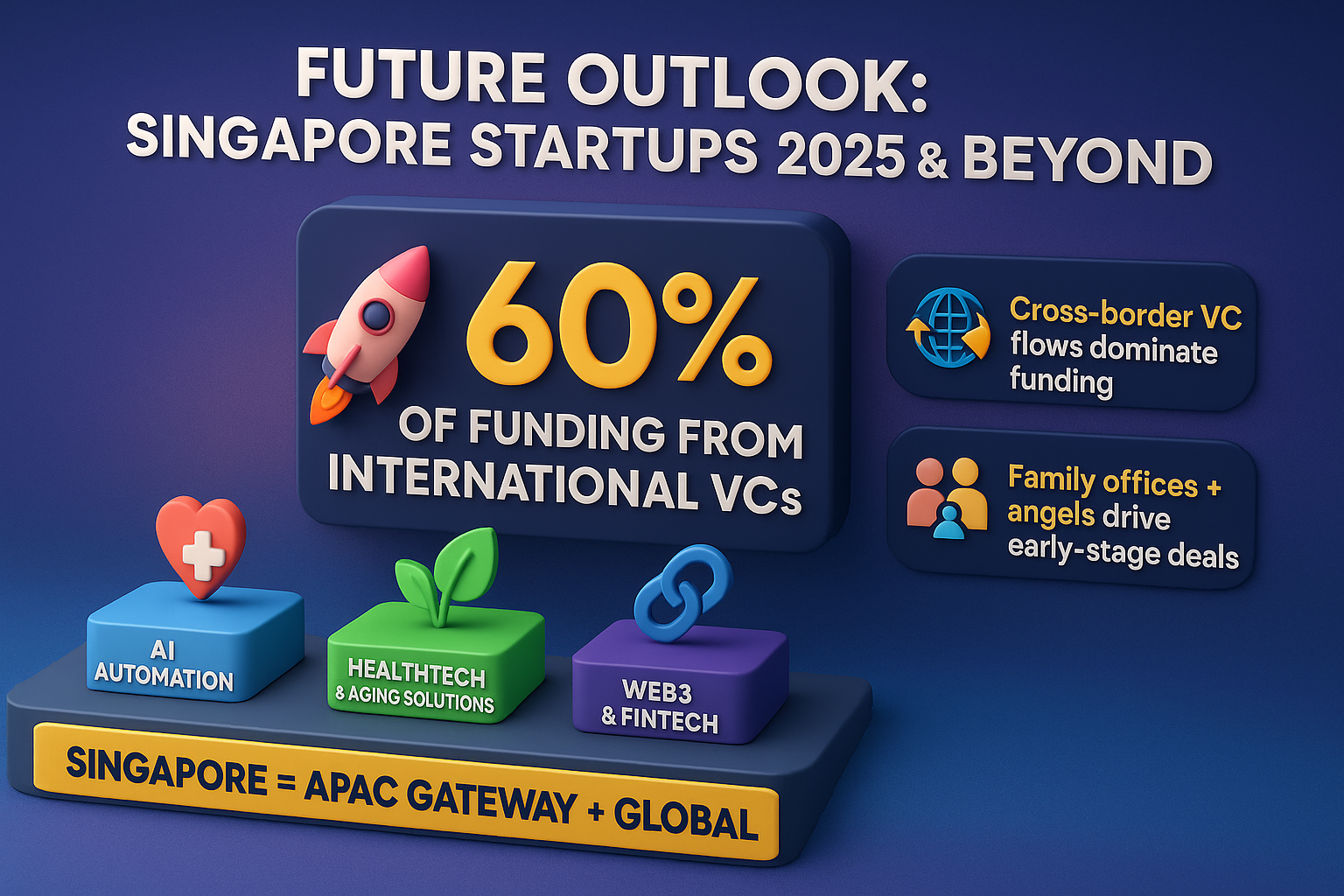
The Singapore startup ecosystem in 2025 is already a leading force in Asia, but the future promises even bigger opportunities. With global investment, emerging technologies, and supportive policies, Singapore is shaping the next decade of innovation. Startups, investors, and founders must understand where the ecosystem is heading to remain competitive.
Emerging Sectors Driving Growth
Several industries are set to define the future of startups in Singapore. According to PwC’s 2025 Global Tech Outlook, AI, healthtech, climate tech, and blockchain will attract the most funding. In Singapore, these sectors are already prioritized with targeted grants, accelerators, and R&D incentives.
Key areas to watch include:
AI and automation startups driving efficiency across industries.
Healthtech solutions addressing aging populations in APAC.
Green and climate tech supported by Singapore’s carbon reduction commitments.
Web3 and fintech innovations building on Singapore’s reputation as a financial hub.
Startups focusing on these areas will benefit from both government-backed funding and increasing investor demand.
Evolving Investor Landscape
The future of startup funding in Singapore will see even more cross-border capital flows. By 2025, international venture capital firms will account for nearly 60% of startup funding rounds in Singapore. This highlights Singapore’s global magnetism and its role in connecting APAC startups to worldwide opportunities.
Angel investors and family offices are also playing bigger roles. Many are targeting early-stage deals in Singapore as a way to enter the booming Southeast Asian market. This diversity of funding sources provides startups with more flexibility and strategic opportunities.
Singapore’s Role in the APAC Ecosystem
Looking beyond 2025, Singapore will remain a gateway for APAC expansion. With its advanced infrastructure, strong intellectual property laws, and deep global connections, the city-state will continue to attract both homegrown startups and foreign founders.
At the same time, challenges like rising costs and competition from emerging hubs (such as Jakarta and Ho Chi Minh City) mean that Singapore must innovate constantly to maintain its edge. Startups that balance Singapore’s advantages with cost-effective scaling strategies in nearby markets will be best positioned for long-term growth.
The outlook for Singapore startups beyond 2025 is one of continued leadership, regional influence, and global ambition.
Conclusion
The Singapore startup ecosystem in 2025 stands as one of the strongest in APAC, blending government support, global capital, and a diverse talent pool. For founders, Singapore is not just a local hub but a launchpad for APAC expansion and international reach. While challenges such as rising costs and regional competition exist, the city-state’s infrastructure and reputation give startups a competitive edge. With emerging sectors like AI, healthtech, and climate tech shaping the future, Singapore remains a magnet for ambitious entrepreneurs. For investors and founders alike, Singapore in 2025 offers not only opportunities but also long-term sustainability in growth.
Singaporean Startup Frequently Asked Questions
Why is Singapore considered the best startup hub in APAC in 2025?
Singapore combines strong government policies, global investor access, advanced infrastructure, and an international reputation, making it the most reliable launchpad for startups scaling across APAC.
What sectors are most promising for startups in Singapore in 2025?
Sectors such as AI, fintech, healthtech, climate tech, and Web3 are heavily supported by investors and government programs, giving startups in these industries strong growth opportunities.
How does Singapore support early-stage founders in 2025?
Through startup grants, innovation labs, and global alliances, Singapore helps founders secure funding, mentorship, and cross-border connections, ensuring they can compete regionally and globally from day one.
Can foreign founders easily start a business in Singapore in 2025?
Yes, Singapore’s streamlined regulations, startup-friendly visa programs, and global investor presence make it easier for foreign founders to set up, fund, and expand their ventures.

